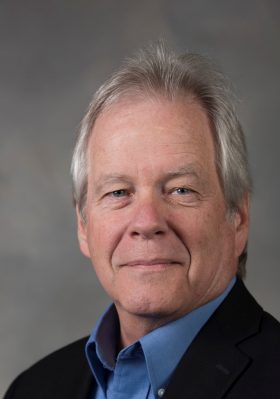Religious Studies Professor Jeffrey Pugh writes about the impact of experiencing a naturalization ceremony at the home of Thomas Jefferson on the nation's birthday
This column by Jeffrey Pugh, the Maude Sharpe Powell Professor of Religious Studies at Elon, was published in the Fayetteville Observer and The Daily Progress in Charlottesville, Virginia. Views expressed in the column are those of the author and not necessarily of Elon University.
—
By Jeffrey Pugh
Seventy of them came up the mountain to Mr. Jefferson’s house from 35 different countries, some of which are among the most war torn and decimated parts of our world. They came because of a dream, just like many of our ancestors did.

What I was not ready for was my tears, my constricted throat and sniffling nose, as those brave people mounted the podium to take their vows. I’m not one given to patriotic emotion because I’ve seen too much evil done in its name, but sitting on Monticello’s lawn my suspicions were tempered by those who stood in front of me. Was I grieving the death of the dream of us—all nationalities, ethnicities, faiths—living and working together as a nation?
These days it feels as if our story, the one that we’ve lived by for centuries, is slipping away. Was I weeping for the ones who were Muslim, Jewish, black, or brown who would endure the hatred that seems too easily unleashed now? Perhaps I was crying because I was watching what courage looked like, the courage of a Afghanistan teenager to walk months through war-torn countries to be here.
What I do know is that as our founding documents were read, as we heard the words of freedom and hope, I thought that this promise of a land where persons could come and live in the freedom of their conscience, worship the God they wanted, and allow others the freedom to do the same, was what inspired those of us gathered on Jefferson’s lawn. We cheered, sang, and celebrated it all together, and for one moment it felt like it was still in our grasp to be this kind of people. It did not feel that it was all sand falling out of our hands.
These days I am more inclined to see the darkness that is coming over us, the roughness that marks so many spaces where we communicate with one another in disembodied words typed to impersonal communities. I sense the creeping decay that takes place in a society when it sells human beings to the highest bidder, or most powerful corporations, as if we possessed no value beyond what we are able to produce. As I watch the ongoing attempts by politicians to seduce religious leaders I’m acutely aware of the idolatry of faith being used to mobilize fear.
But, in this moment, drenched in the sweat of a humid Virginia morning in July, I found myself saying yes to the promise of America—yes to the land where refugees are welcome because we remember that if we were to pull the threads of the tapestry that leads to us, our parents and grandparents would be found.
So, for those who would shut this country off from people who aren’t like you, please think deeply about who we are, the promise of what we are, and the potential of what we can become. Think about the reality that we are stronger because we are a nation of immigrants who came here because we were, and can be again, a lighthouse in a dark world.
I witnessed at Monticello that we have several more brothers and sisters, some with head coverings, others with saris, some with robes, all of whom care about this place as much as we do. I stood with them and said vows as well, vows that said I would “strengthen my bonds with my fellow citizens” and I would honor the best of America. I stood on top of the mountain and promised that I would care for these new citizens because that is our commitment to one another; that is who we were meant to be.


